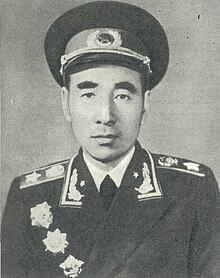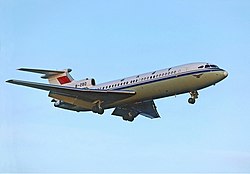Lin Biao incident
|
Marshal Lin Biao |
|
|---|---|
 |
|
| 2nd First Vice Chairman of the Communist Party of China | |
|
In office August 1, 1966 – September 13, 1971 |
|
| Chairman | Mao Zedong |
| Preceded by | Liu Shaoqi |
| Succeeded by | Zhou Enlai |
| Vice Chairman of the Communist Party of China | |
|
In office May 25, 1958 – September 13, 1971 |
|
| Chairman | Mao Zedong |
| 2nd First-ranking Vice Premier of the People's Republic of China | |
|
In office December 21, 1964 – September 13, 1971 |
|
| Premier | Zhou Enlai |
| Preceded by | Chen Yun |
| Succeeded by | Deng Xiaoping |
| Vice Premier of the People's Republic of China | |
|
In office September 15, 1954 – September 13, 1971 |
|
| Premier | Zhou Enlai |
| 2nd Minister of National Defense | |
|
In office September 17, 1959 – September 13, 1971 |
|
| Premier | Zhou Enlai |
| Preceded by | Peng Dehuai |
| Succeeded by | Ye Jianying |
| Personal details | |
| Born |
December 5, 1907 Huanggang, Hubei, Qing Empire |
| Died | September 13, 1971 (aged 63) Öndörkhaan, Mongolia |
| Political party | Communist Party of China |
| Spouse(s) |
Zhang Mei[] (1937–42) Ye Qun (1942–71) |
| Children |
Lin Xiaolin[] (daughter) Lin Liguo (son) Lin Liheng (daughter) |
| Alma mater | Whampoa Military Academy |
| Awards |
|
| Military service | |
| Service/branch |
|
| Years of service | 1925–1971 |
| Rank |
|
| Lin Biao | |||||||||||||||||||||

"Lin Biao" in regular Chinese characters
|
|||||||||||||||||||||
| Chinese | 林彪 | ||||||||||||||||||||
|---|---|---|---|---|---|---|---|---|---|---|---|---|---|---|---|---|---|---|---|---|---|
|
|||||||||||||||||||||

A Hawker Siddeley Trident, similar to the aircraft involved.
|
|
| Occurrence | |
|---|---|
| Date | 13 September 1971 |
| Summary |
|
| Site | near Öndörkhaan, Mongolia 47°19′N 110°39′E / 47.317°N 110.650°ECoordinates: 47°19′N 110°39′E / 47.317°N 110.650°E |
| Aircraft | |
| Aircraft type | Hawker Siddeley HS-121 Trident 1E |
| Operator | People's Liberation Army Air Force |
| Registration | B-256 |
| Flight origin | Qinhuangdao Shanhaiguan Airport, Qinhuangdao, Hebei Province, China |
| Destination | Soviet Union |
| Passengers | 8 |
| Crew | 1 |
| Fatalities | 9 (all) |
| Survivors | 0 |
Lin Biao (December 5, 1907 – September 13, 1971) was a Marshal of the People's Republic of China who was pivotal in the Communist victory in the Chinese Civil War, especially in Northeast China. Lin was the general who commanded the decisive Liaoshen and Pingjin Campaigns, in which he co-led the Manchurian Field Army to victory and led the People's Liberation Army into Beijing. He crossed the Yangtze River in 1949, decisively defeated the Kuomintang and took control of the coastal provinces in Southeast China. He ranked third among the Ten Marshals. Zhu De and Peng Dehuai were considered senior to Lin, and Lin ranked directly ahead of He Long and Liu Bocheng.
Lin abstained from taking an active role in politics after the civil war ceased in 1949. He led a section of the government's civil bureaucracy as one of the co-serving Deputy Vice Premiers of the People's Republic of China from 1954 onwards, becoming First-ranked Vice Premier from 1964. Lin became more active in politics when named one of the co-serving Vice Chairmen of the Communist Party of China in 1958. He held the three responsibilities of Vice Premier, Vice Chairman and Minister of National Defense from 1959 onwards. Lin became instrumental in creating the foundations for Mao Zedong's cult of personality in the early 1960s, and was rewarded for his service in the Cultural Revolution by being named Mao's designated successor as the sole Vice Chairman of the Communist Party of China, from 1966 until his death.
...
Wikipedia
